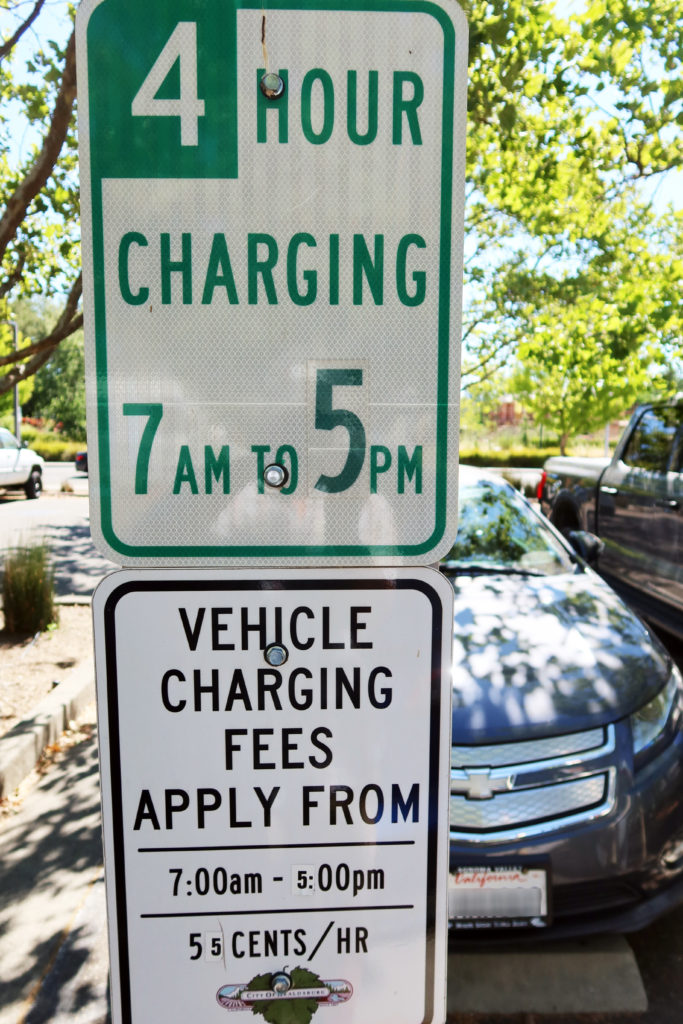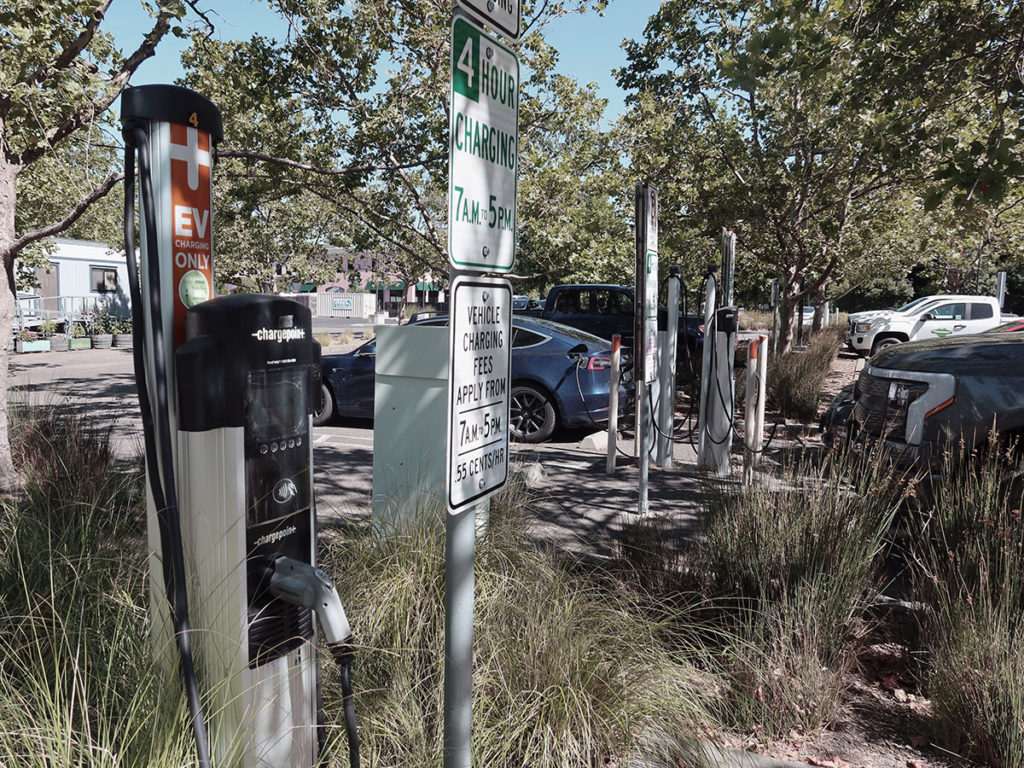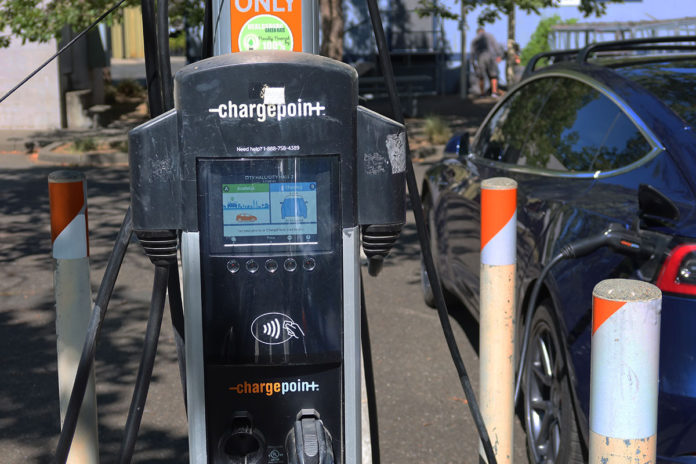Healdsburg has been coming up short some $37,000 annually on its EV charging program, the City Council learned a couple of weeks ago. For every $44,000 it costs for the electric chargers to operate, including the actual price per kilowatt hour to run the chargers, the city only collects $7,000 in fees.
The reason for this mathematical mismatch is that the city only charges 55 cents per hour to the vehicles using them, and that for just 10 hours a day, five days a week. The rest of the time the chargers are free, yet still operable—delivering precious electrical flow to satisfy the hungry batteries of local and visiting EV drivers.
City utility conservation analyst Terra Sampson supplied the information during a June 17 presentation, to encourage updating the public electric vehicle charging fees applied at city-owned EV charging stations.

The city owns and operates 12 such EV charging stations, administered by the ChargePoint app and located in City Hall’s north parking lot. A number of privately owned but publicly accessible charging stations exist elsewhere in Healdsburg, at locations such as hotels and shopping areas. EV drivers can use apps such as ChargeHub, EVHype and Plugshare, in addition to ChargePoint, to locate these stations.
The shortfall does not equate to a direct budget loss, however. The city’s public chargers are among the programs funded by California’s Cap and Trade program, with the stipulation they be used to benefit electric ratepayers and reduce greenhouse gas emissions. Other supported programs include EV discounts for low-income ratepayers, e-bike rebates, energy efficiency rebates and appliance replacement.
Bringing into line the fees charged to EV battery users with their actual cost, argued Sampson, would make more Cap and Trade funds available to expand the city’s EV charger program to other city-owned parking lots, including at 228 Healdsburg Ave. and the Senior Center parking lot at 311 East St. New chargers are planned for both locations, and several others as well.
Price Hike
For owners of EVs and hybrids who charge at home, the cost per kilowatt hour in Healdsburg is $1.95, four times more expensive than what the city charges—and that’s only when the ChargePoint clock is ticking. So it’s not unreasonable for a resident to charge at one of the city’s 12 bargain-priced charging stations instead of at home.
And some, apparently, do just that. “On average, once per month a vehicle parks for longer than 24 hours and does not pay anything,” Sampson said. The same studies from 2023-2024 show that roughly half of these scofflaw overparkers have a Healdsburg zip code.
The upshot is that Sampson recommended that the council significantly increase the pricing policy for the city’s 12 currently operating stations, some of which have been operational since 2013. No more free charging: Rates would be staggered to reflect peak-use hours, and brought more in line with the actual cost of providing the charging service.
The new rates may better reflect accurate cost of electricity, but they will still be a bargain: $1.50 an hour between 7am and 5pm, then up to $1.80 an hour during peak-use hours between 5pm and 8pm, periods of high grid use. Between 8pm and 7am rates would drop to $.80 an hour, in keeping with off-hour electric rates.
The new rates will likely be rolled in over a three-year period, in keeping with the city’s habitually delayed roll-in on utility charges. But some new fees will begin later this year, after the utility department presents new rates and the council agrees. Customers at the city’s charging stations will see the difference on their ChargePoint statement as soon as September.
Overnight Parking

Healdsburg’s bargain EV charging rate is only part of the problem, however. “Staff and local EV drivers have noted challenges when EV drivers do not move their vehicle when charging is complete,” Sampson said. In other words, people charge up and leave their cars or trucks in the city lot long past the time their own charging is finished, taking up potential spaces for other electric cars to charge.
Though the figures show almost 20,000 successful charging sessions over the past two years, the average time per session equated to 4 hours, 43 minutes. “However,” her report continued, “47 charging sessions were longer than 24 hours, and 25 of these charging sessions did not have any user fees [due to weekend parking]. In other words, on average, once per month a vehicle parks for longer than 24 hours and does not pay anything.”
About half of the weekday overnight users are Healdsburg residents, according to Sampson.
The discovery of this loophole in the city’s enforcement caused Mayor David Hagele to stir in his seat at the dais. “Aren’t there 4-hour parking signs there?” he asked the city staff. “So they could get a ticket. How does that work? And those tickets could go to reimburse [the city’s] electricity.”
The question drew a smiling response from Police Chief Matt Jenkins. “Very good question,” Jenkins said. “The municipal code doesn’t have a specific section that speaks to EV parking, and we are looking at the parking ordinance as we speak. That’s likely something they’ll be coming back to after your July recess, probably in September.”
Councilmember Ariel Kelley asked, “Are we currently enforcing, or no?” No, came the reply. “OK, but don’t tell anybody,” she added with a wink.
Regardless, Sampson wanted it made clear that electricity remains a cheaper fuel source than gasoline. “It is also important to note that whether charging at home or at the city chargers, electric fuel is cheaper than gasoline,” she said. “In 2023, California gasoline was $4.88 per gallon, costing $2,440 annually for the average gasoline vehicle.
“Charging at home in Healdsburg is estimated to cost at least 50% less than a gasoline vehicle, and even with the adjusted fees, staff estimates that Healdsburg’s charging stations will continue to be cheaper than charging at home,” she added.










Why is the City Council in the EV charging business? Why is Healdsburg subsidizing Prius and Tesla car owners? Those cars are expensive. I don’t see many if any, poor people driving Teslas and Priuses.
Plenty of very poor people in other countries do mine the minerals that make those EVs possible. Mining cobalt and rare earths is up 2,000% to make those EV batteries and cars. That’s a lot of kids working in the dirt and mud to mine those minerals for the Tesla and Prius drivers and owners.